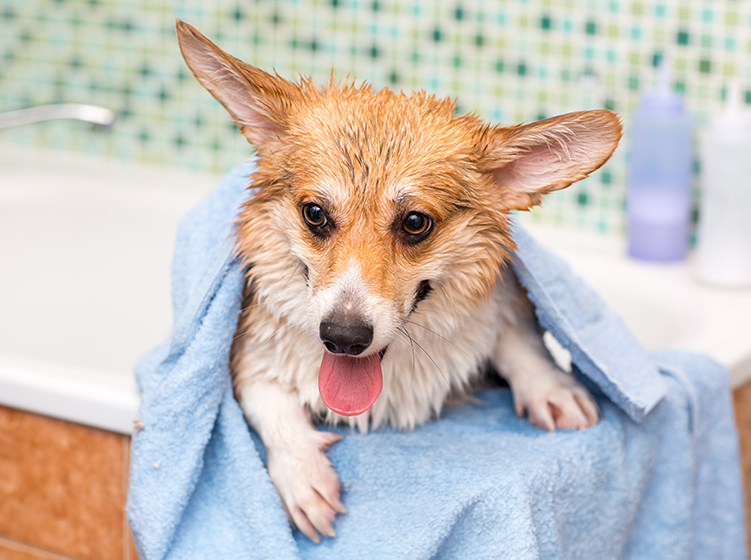Dog Allergy Guide: Tips for a Happier, Healthier Pup

While many people love spring and summer because of the warmer weather, many people also dread having to deal with seasonal allergies. Many of us are affected by sneezing, coughing and sinus issues every year. However, most people don’t realize that their dogs could be feeling the effects of seasonal allergies, too.


Most dogs feel the worst of it at the same times as we do: end of spring to early summer and late summer to early fall. Dogs that suffer from seasonal allergies react to the same allergens we do, such as pollen and grass. While all breeds can be affected, some of the dogs we see dealing with allergy symptoms most often are labs, golden retrievers, bulldogs, bichons, goldendoodles, and pitbulls.
There are many symptoms that could indicate your dog is suffering from seasonal allergies. These symptoms can range from mild to severe. Not all dogs will show allergy symptoms, either. Some of the most common symptoms are:
- Itching: Many dogs develop very itchy skin during allergy seasons. They will likely be itching all over but may also be limited to specific areas – we often see dogs itching on their sides, stomach, and ears. If you are unsure if your dog is just scratching a single itch or scratching because of allergies, try to pay attention to how much they are scratching. If it is often enough to distract you or to keep them up at night, it could be due to allergies.

- Skin infections: A lot of dogs that itch due to allergies end up with skin infections. This is due to yeast and bacteria entering the tiny tears made in your dog’s skin by their nails. If you notice sores, scabs, discharge, and inflammation on their skin in addition to itchiness, call your vet; most skin infections need prescription treatments, often topical ointments and sprays or oral antibiotics, to fully heal.
- Ear infections: Similar to skin infections, ear infections can be caused by your dog scratching and creating tiny openings in the skin within their ears where bacteria and yeast thrive. If you notice continued ear scratching, head shaking, discharge/waxy buildup, or smelly ears, your dog may have an infection. Ear infections are unlikely to heal on their own, so bring your dog to your vet clinic to be treated. Your vet will likely swab their ears and check the growth under a microscope as the findings will determine the best course of treatment.
- Licking: In addition to scratching, dogs often lick their skin as a means to calm the itchy feeling. They may lick all over, but we often see dogs licking their paws, legs, and stomach. Similar to itching, if your dog is staying up at night to lick, they could be suffering from allergies. Lick staining, a brown stain on your dog’s fur from their saliva, may also develop if they are licking the same spot excessively.
- Anal gland issues: Many dogs that suffer from allergies need their anal glands expressed often to avoid infections or abscesses. Dogs often tell us they need their anal glands expressed by scooting or licking their rear end. This job is best done by a veterinarian or a veterinary technician as most groomers are unable to fully express the glands.
- Eye issues: Dogs with allergies commonly have inflamed and runny eyes. Sometimes eye infections arise if the dog is scratching at their eyes and introducing bacteria and yeast to them, but most often it is similar to a human having itchy eyes during allergy seasons. If you notice your dog has a lot of eye discharge, it is okay to wipe it away with a damp washcloth but avoid putting anything in the eyes without your vet’s recommendation.

Many allergy treatments exist for dogs. One option is to take measures to prevent infections secondary to allergy symptoms. Giving your dog regular baths, at least once or twice a month, can help relieve the itchiness that leads to skin infections. When it comes to choosing a dog shampoo, a medicated shampoo could be a good idea if your dog suffers from frequent skin infections. Another preventative measure is cleaning your dog’s ears to help prevent ear infections. You can use an over-the-counter cleaner or one prescribed by your vet. Cleaning ears once weekly helps clear discharge and any germs lingering in your dog’s ears before it can cause an infection. Cleaning them after your dog swims or bathes also helps prevent a buildup of trapped water (which causes infections) in your dog’s ears as most cleaners contain a drying agent. Regular anal gland expressions are the best way to help prevent anal gland infections. Some dogs may never need them expressed, but dogs that do need regular expressions generally need them every 4 to 8 weeks.
Another treatment option is allergy medications. A good first step is to try an over-the-counter allergy medication for humans, like Benadryl, Claritin, or Zyrtec; however, you should always discuss with your veterinarian before starting your dog on any medications, especially ones that are not prescribed by your vet directly. Your vet can help give you guidance on what is safe for your dog and the proper dosing. Some dogs do respond well to these over-the-counter treatments, which are often cheaper than prescription medications, but some dogs need more to control their symptoms. Many prescription medications to treat allergies exist for dogs. Your vet can help you decide which one is the best fit for your dog based on the symptoms your dog has and their lifestyle.
Finally, there is an allergy injection available for dogs called Cytopoint. It is an antibody that works by targeting proteins in the body that cause itchiness, helping to stop your dog from scratching. It can last in your dog’s body for 4-8 weeks, so you don’t have to worry about remembering to give your dog a pill every day.
If you are unsure if your dog is suffering from allergies, talk to your vet about what symptoms you are seeing. It is important to remember that most allergy symptoms can be due to unrelated causes, so a single skin or ear infection does not necessarily mean your dog has allergies. However, if you are seeing more than one symptom or are noticing the same symptoms more than one year in a row during the same seasons, talk to your vet about your concerns and see what treatments are the best fit for your pup. It is also important to remember that not all treatments will work for your dog, so it may take some trial and error to find what helps your pup feel some relief.
The Veterinary Centers of America (VCA) website has some more information about allergies (not just seasonal allergies) in dogs that is written by vets. If you have more questions about allergies in general, check it out: https://vcahospitals.com/know-your-pet/allergy-general-in-dogs
The University of Wisconsin-Madison Vet School has a brochure explaining more about what Cytopoint is, how it works, and its effectiveness. Read more here: https://uwveterinarycare.wisc.edu/wp-content/uploads/2018/04/Cytopoint-2018.pdf
Good luck helping your dog have an itch-free summer!






































































